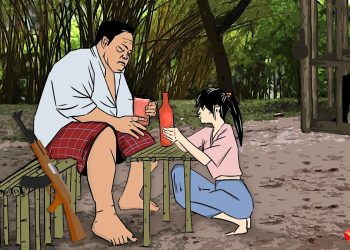RANGOON — The United States will not turn a blind eye to problems including human rights violations in Burma, Secretary of State John Kerry said during his visit to the country, while reaffirming his government’s endorsement of President Thein Sein’s reforms.
Kerry spent Saturday and Sunday in Burma, attending a regional meeting in Naypyidaw and meeting with Thein Sein and Parliament Speaker Shwe Mann.
“We had a very frank discussion with the president and with his team,” Kerry told a press conference in the capital on Sunday that was broadcast on state television, describing the talks as “very comprehensive.”
“We talked about human rights; we talked about the law; we talked about democracy and how you move to it; we talked about the election and the need for it to be open and free and fair; we talked about people’s full participation without penalty; we talked about journalists who recently have been arrested.”
Kerry reportedly also raised US concerns over ongoing discrimination against the Rohingya Muslim minority in Arakan State. Lawmakers in Washington and international rights groups had called for Kerry to take a harder line with the Burmese government during the visit, in view of so-called “backsliding” on human rights since US President Barack Obama visited the country in 2012.
The US rewarded the Thein Sein reformist government’s early signs of progress with the suspension of most economic sanctions, although some individuals remain blacklisted by the US Treasury Department and an arms embargo against Burma continues.
“The sanctions are now very much focused on members of the junta and on key individuals who may still be representing a challenge to achieving [the reforms], but this is fundamentally a new government, in a new moment, with a possibility for an election next year,” Kerry said, adding that it was important to recognize “legitimate effort” toward democracy in Burma.
“Is everything hunky-dory? No, not yet. Absolutely not…” he said.
“We will continue to work very, very carefully, without jumping ahead of anybody’s rights and without turning a blind eye to anything that violates our notion of fairness, accountability, human rights and the standards by which America always stands. And those will be forefront in all of our discussions as they were throughout the last two days.”
Following the press conference, Kerry flew to Rangoon and paid a call on opposition leader Aung San Suu Kyi at her villa on the bank of Inya Lake. During his talks with Burmese government leaders, Kerry reportedly supported the campaign—led by Suu Kyi and receiving mass public support—for the 2008 Constitution to be amended ahead of parliamentary elections expected in late 2015.
The current wording of the military-drafted charter precludes Nobel Peace Prize winner Suu Kyi from contesting the presidency, as well as containing a number of measures that give the Burmese military a prominent role in politics.
Kerry—who vacillated between using the names Burma and Myanmar to refer to the country—said “the evolution of Myanmar into a full democracy” would take time.
“It doesn’t happen overnight—anywhere. It didn’t happen overnight in the United States of America. We started out with a Constitution that had slavery written into it, before 100 years later it was finally written out of it. It sometimes takes time to manage change,” he said.
“Now that doesn’t allow you to turn a blind eye to things that are critical, and we’re not. You have to call them to account. And I believe we’ve been very clear about that.”

















